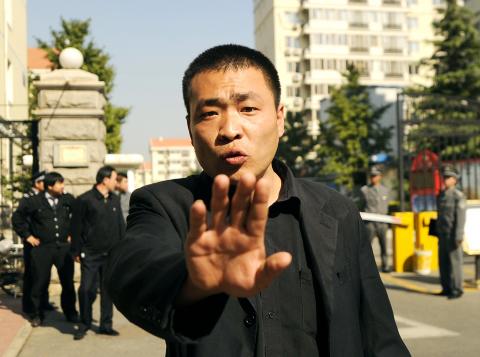The wife of jailed Chinese Nobel Peace laureate Liu Xiaobo (劉曉波) slammed the government on Wednesday for keeping her under “illegal house arrest” since her husband won the award last week.
Liu Xia (劉霞) has been largely confined to her home since Friday when the Nobel Committee in Oslo awarded this year’s prize to her dissident husband for advocating political reform and respect for human rights in China.
“I strongly protest against the government for my illegal house arrest,” she said on her Twitter account — her only link to the outside world — and called her situation “very hard to take.”

PHOTO: AFP
She said earlier that two Norwegian diplomats attempted to visit her on Tuesday, but were turned back at the entrance to her apartment block.
The Norwegian embassy confirmed that account.
The diplomats were “outside the gates of her compound, [having come] to check on her condition,” embassy spokeswoman Tone Helene Aarvik said, refusing to provide more details.
Liu Xia has said she hopes to travel to Norway to accept the award for her husband, who was sentenced last December to 11 years in jail on subversion charges after co-authoring “Charter 08,” a bold call for political reform.
She has been communicating via Twitter after her cellphone was cut off earlier in the week. A replacement phone now has also been cut off, Liu said in a tweet late on Tuesday.
“I had the phone for only a day and already it has been cut off by the hoodlums,” she said.
In her latest tweet, she said her confinement was taking a toll on her family.
“My elderly 77-year-old mother came over to see me today because I did not phone my family yesterday. [They’re] concerned,” she wrote.
Beijing police declined to comment on the situation.
One of her husband’s lawyers said yesterday they also had no way of reaching her.
“We can’t contact her at the moment. We are just waiting and hopefully we can find a way to get in touch soon,” attorney Shang Baojun (尚寶軍) said.
Liu Xia has sent a handful of messages via her Twitter account Liuxia64 with brief updates on her situation since Friday.
She has been under house arrest since the award was announced, except for a weekend trip under police escort to the prison in northeastern China where her husband is jailed.
The controls are apparently aimed at preventing her from talking to reporters as part of a huge campaign by the government — which is furious over the award — to stifle news of the prize in China’s media and on the Internet.
On Tuesday, Shang said Liu Xia wanted to ask a higher court for a retrial of her husband. A Chinese foreign ministry spokesman refused to comment on her case when asked about it at a regular news briefing on Tuesday.
The US, one of many countries that has called for Liu Xiaobo’s immediate release, on Tuesday expressed concern about Liu Xia.
“Her rights should be respected, and she should be allowed to move freely without harassment,” a spokesman for the US embassy in Beijing said.

PRECARIOUS RELATIONS: Commentators in Saudi Arabia accuse the UAE of growing too bold, backing forces at odds with Saudi interests in various conflicts A Saudi Arabian media campaign targeting the United Arab Emirates (UAE) has deepened the Gulf’s worst row in years, stoking fears of a damaging fall-out in the financial heart of the Middle East. Fiery accusations of rights abuses and betrayal have circulated for weeks in state-run and social media after a brief conflict in Yemen, where Saudi airstrikes quelled an offensive by UAE-backed separatists. The United Arab Emirates is “investing in chaos and supporting secessionists” from Libya to Yemen and the Horn of Africa, Saudi Arabia’s al-Ekhbariya TV charged in a report this week. Such invective has been unheard of

US President Donald Trump on Saturday warned Canada that if it concludes a trade deal with China, he would impose a 100 percent tariff on all goods coming over the border. Relations between the US and its northern neighbor have been rocky since Trump returned to the White House a year ago, with spats over trade and Canadian Prime Minister Mark Carney decrying a “rupture” in the US-led global order. During a visit to Beijing earlier this month, Carney hailed a “new strategic partnership” with China that resulted in a “preliminary, but landmark trade agreement” to reduce tariffs — but

Chinese President Xi Jinping’s (習近平) purge of his most senior general is driven by his effort to both secure “total control” of his military and root out corruption, US Ambassador to China David Perdue said told Bloomberg Television yesterday. The probe into Zhang Youxia (張又俠), Xi’s second-in-command, announced over the weekend, is a “major development,” Perdue said, citing the family connections the vice chair of China’s apex military commission has with Xi. Chinese authorities said Zhang was being investigated for suspected serious discipline and law violations, without disclosing further details. “I take him at his word that there’s a corruption effort under

China executed 11 people linked to Myanmar criminal gangs, including “key members” of telecom scam operations, state media reported yesterday, as Beijing toughens its response to the sprawling, transnational industry. Fraud compounds where scammers lure Internet users into fake romantic relationships and cryptocurrency investments have flourished across Southeast Asia, including in Myanmar. Initially largely targeting Chinese speakers, the criminal groups behind the compounds have expanded operations into multiple languages to steal from victims around the world. Those conducting the scams are sometimes willing con artists, and other times trafficked foreign nationals forced to work. In the past few years, Beijing has stepped up cooperation